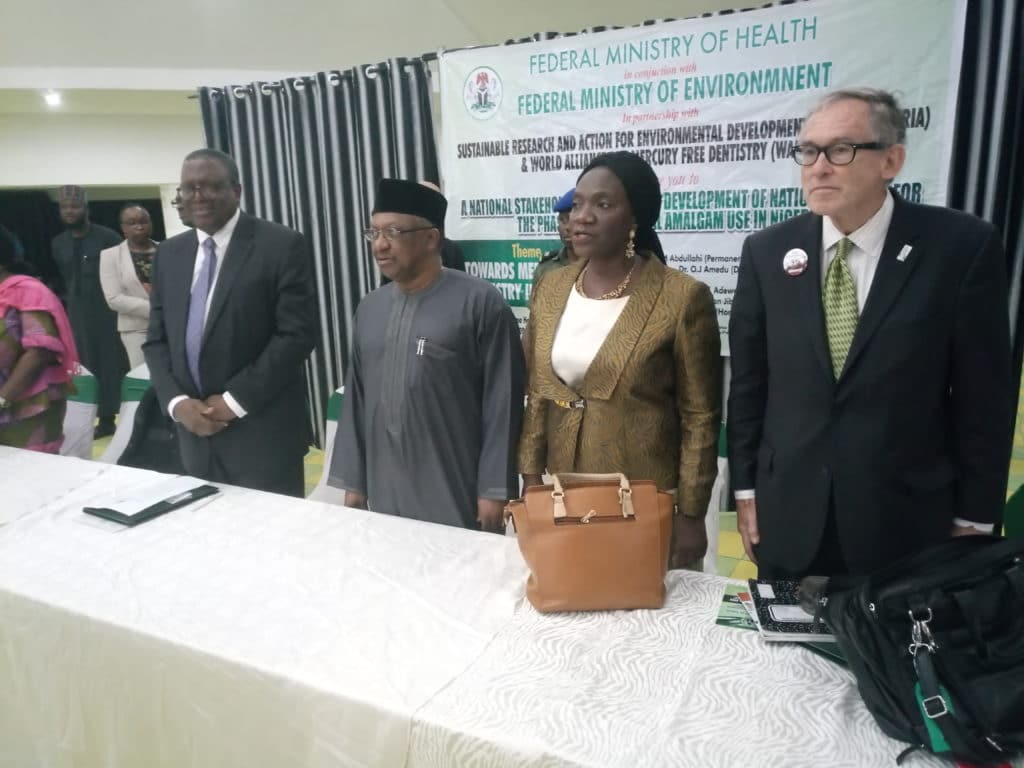Over 40 civil society organisations (CSOs), including the Sustainable Research and Action for Environmental Development (SRADev Nigeria), on Tuesday, October 27, 2020 celebrated the 7th “Africa Day for Mercury-free Dentistry”.

This year’s celebration is regarded as special.
“This year is a very special one since we are pushing to make effective the African Amalgam Amendment in Minamata Convention a reality for next year at COP4,” says Dr Leslie Adogame of SRADev.
After signing the “Abuja Declaration” in 2014 in Nigeria, calling for Africa to be the first continent on the planet to end the use of mercury in dental care, Africa CSOs developed a plan in Abidjan in 2015 in Cote d’ Ivoire to implement the Abuja Declaration.
The “Abidjan Plan”, it was gathered, presented key objectives and strategies to achieve a real and phase out of dental amalgam on the continent. The CSOs also set every October 13th (or the fortnight around this date) to be the day to raise awareness on a specific issue towards phase out of dental amalgam in dentistry.
“After several campaigns our voices have been echoed by African countries who officially asked in November 2019 – through the African Amalgam Amendment – a clear date for a phase out of dental amalgam in the whole world,” added Dr. Adogame.
He described mercury as a neurotoxin that can damage children’s developing brains and nervous systems even before they are born.
“It is due to this fact that the CSOs dedicated this day, to call for governments to start making amalgam a history by imposing a total ban of dental amalgam in milk teeth and in pregnant and nursing women.”
According to him, the continuous use of dental amalgam fillings, which are 50% mercury, is no more justified because alternatives are now affordable, effective, and available in Africa.
Adogame added: “The restriction of its use is demanded worldwide in the Minamata Convention on Mercury, adopted by more than 140 governments including Nigeria, in Kumamoto Japan. This Convention which entered into force on August 16, 2017, held its first conference of Parties from September 24 to 29, 2017 in Geneva, Switzerland.
“The theme of this COP1 was to ‘make mercury history’ showing the international will to deal with mercury including dental amalgam. Since then and after so many debates and advocacy at COP 1 in 2017 and COP2 in 2018, it has been introduced by the Africa Region an amendment to the Convention asking and proposing a set of dates to achieve a phase out of dental amalgam by 2024.
“To end use of dental amalgam in children/milk teeth is possible since Mercury-free dental restorative materials are far less expensive than dental amalgam when environmental and societal costs are factored in. The costs of using mercury-free options (including retreatment) is about half the cost of amalgam without retreatment, making this mercury-free technique significantly more affordable in low-income communities, particularly in areas without electricity or dental clinics.
“We are calling on the government of Nigeria and other governments in Africa to still support the African Amendment so to make amalgam history starting by ending its use in African children teeth, pregnant and nursing women too. In the whole world, amalgam use is lowest in Africa, so we are nearer to the finish line than any continent.”
He disclosed that Mauritius has a policy of no amalgam for children since 2014, while the European Union, with 27 member nations, banned amalgam since July 1, 2018 for children, and for pregnant and nursing women. He noted that several African nations have already developed regulations, policies and guidelines to phase out amalgam in their territories.
Dominique Bally of Cote d’Ivoire, the World Alliance for Mercury-Free Dentistry’s vice president for Africa, said: “The African region has started ending amalgam use in children and in women, even if developed countries still want to continue to dump amalgam into our region. Sending amalgam for use in African children (and others vulnerable population) is not charity nor humanitarian assistance – it’s an environmental health disaster and we can no more accept that.”
He added that countries like Benin, Burundi, Cameroon, Congo, Côte d’Ivoire, Ethiopia, Guinea, Ghana, Kenya, Lesotho, Madagascar, Mauritius, Nigeria, Senegal, South Africa, Tanzania, Uganda, Togo, Tunisia and Zambia are raising awareness on the effects of mercury to health and the environment.
